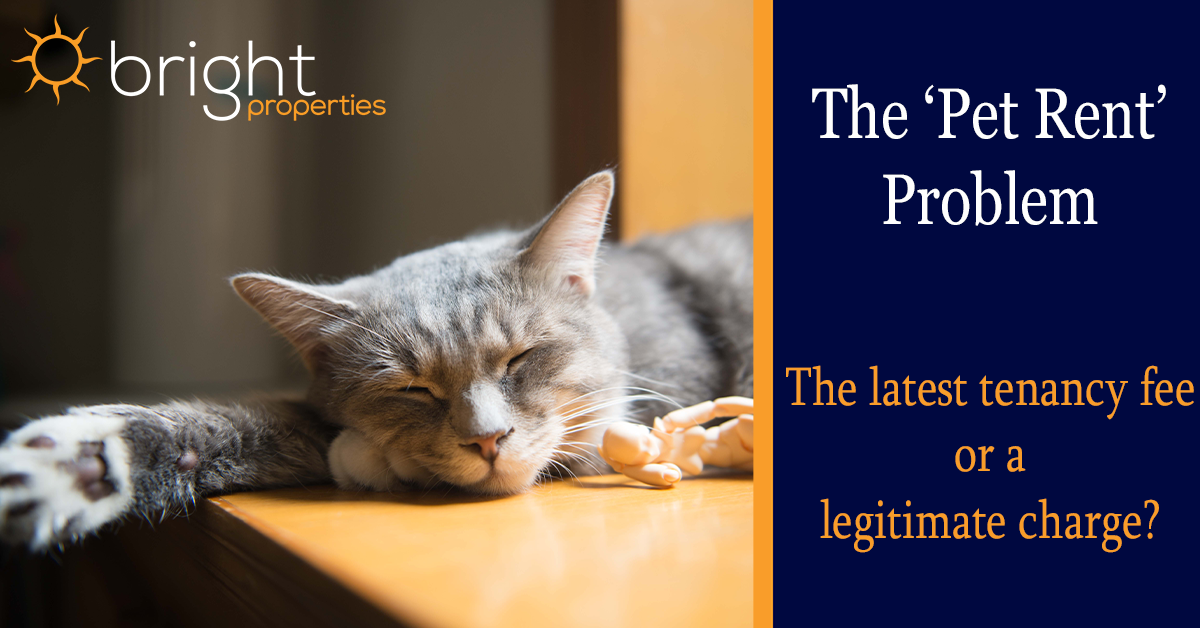
The ‘Pet Rent’ Problem: The latest tenant fee or a legitimate charge?
![]()
Recent headlines show the lettings market adjusting to the June 2019 Tenant Fees Ban by charging extra rent for a pet. Before the Tenant Fees Ban security deposits for properties were uncapped and it was commonplace for landlords to take higher deposits for those tenants that owned pets. Commonly a 6-week deposit was taken without pets, and an 8-week deposit for those with pets. This was to cover the landlord if the pet were to cause damage to the property – such as clawing the carpets, flea infestations etc. Following the Tenant Fees Ban, security deposits were capped at 5 weeks’ rent for the property which greatly reduced the security landlords felt when accepting pets.
As a response to this, landlords and letting agents have either stopped accepting pets or are setting an increased rent in order to accommodate pets. But is this actually necessary – or allowed?
There are several points to consider:
![]()
Are pets really a problem?
Experience through many years of letting out property is that the extra deposit for pets was only part of the picture. There are several reasons for this:
- Best practice was to include provisions in the tenancy agreement requiring prior permission for pets to be kept and for a specific provision making the tenant liable for pet damage. This is still allowed under the Tenant Fees Ban and still best practice. This puts the tenant on risk and the cost of repairing pet damage can still be recovered from a tenant.
- Careful tenant selection significantly reduces the risk. This requires thoughtful references to check prior experiences with landlords, and consideration about the type and number of pets.
- Communication is key. Specific information about the responsibilities of the tenant needs to be provided and care taken to be sure that the tenant has understood.
- Tenants do not like losing all or part of their deposit, and pet owners know that pet damage can lead to this. The 5-week maximum deposit allowed now is still a significant incentive for pets to be controlled.
Using these measures, our experience is that most pet requests can be accommodated.
![]()
How can you recover compensation for damage?
During the tenancy issues should be identified on inspections and the tenant asked to remedy them or pay for them to be remedied. At the end of a tenancy, the check -out report is compared with the check-in inventory to determine how the condition of the property has changed. Fair wear and tear (including that from pet ownership) must be considered in this. Through careful management during the tenancy, our properties have rarely needed any amount taken off the deposit. In the unfortunate event that this has been necessary, it rarely exceeds £200 leaving ample extra security should any larger deductions be needed.
![]()
Is charging ‘pet rent’ crossing the line?
- Is this charge simply a disguised fee that would otherwise be banned? There are clear benefits for both landlords and agents for charging this – higher rent: higher commission – but if the higher rent is not true for all tenants then can this be fair? Different tenants come with different risks (e.g. children) but each risk does not come with an associated rent.
- The reason the Tenant Fees Ban came into place was to prohibit agents and landlords placing unreasonable costs on the tenant. The idea of a ‘pet rent’, while not specifically prohibited in the Tenant Fees Act, is clearly against the spirit of the act and as such is ethically questionable.
- Is charging an extra ‘pet rent’ really outside the scope of the Tenant Fee Ban? There are arguments both ways, and only clarification from the courts following a tenant complaint will settle the issue.
- Of course, extra rent for service animals (e.g. guide dogs) is discrimination. Emotional support animals may also come into this category.
It is worth noting that many insurance policies exclude pet damage so be sure to check your policy carefully. Policies that include cover for pets are widely available.
Bright Properties charge a flat rate for the management of properties and have no hidden fees and charges. We are happy to manage properties where tenants have pets We are focused on building relationships with tenants and looking after the property so that they will look after it and return it to you in good condition. If you would like to find out more about our services, get in touch.
![]()

